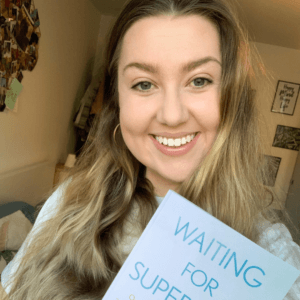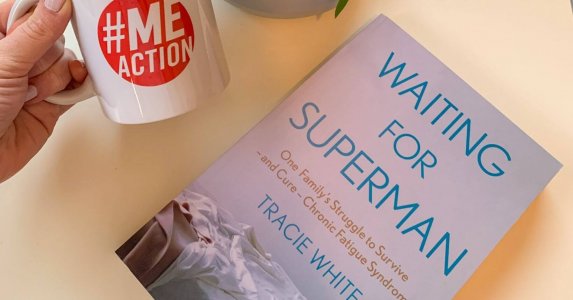Do you want to win a free copy of Waiting for Superman? We have three copies to give away to people in the UK!
Thank you to Atlantic Books for making this giveaway possible.
You can buy Waiting for Superman: One Family’s Struggle to Survive – and Cure – Chronic Fatigue Syndrome from most bookshops, including Waterstones, Amazon and Bookshop.
“Waiting for Superman is more than science” - Charlie Wainwright
Whitney Dafoe has been confined to his bedroom for six years. Unable to walk, eat or speak. He has a disease which the world offers no cure for, nor any treatment. A disease often dismissed and ignored. Whitney has Myalgic Encephalomyelitis. A poorly understood disease which affects 20 million people around the world, one quarter of those with ME are housebound or bedbound like Whitney.
Waiting for Superman shares how far one family will go to save their child’s life. Whitney’s father, Ron Davis, fights for new treatments and potentially a cure. Focused on the science behind the disease he works tirelessly to find a way to stop his son from dying.
This book is more than science, it’s one family’s quest to end the suffering of 20 million people worldwide, starting with their son.
Journalist Tracie White shares Whitney’s story, with his blessing. Sharing his early career as a photographer. The adventures he has journeyed and the girlfriends he has had. Whitney travelled the world, won photography awards, had a favourite flavour ice cream and campaigned for Barack Obama during his presidential campaign. Whitney is not an invisible patient, he’s a human being with a life he is missing from.
Tracie is allowed access to Whitney’s life without boundaries, entrusted to peer through his bedroom keyhole and gaze at his body, his fight. She even gains access to emails between Whitney and his mother when his health first began to decline.
Readers are able to gain an insight into not only the science but also to meet Whitney through his mother, Janet. Her incredible stories are included throughout the book and introduce the world to the creative side of Whitney that she knows he has and always will have. She trusts Tracie with her son’s artwork, his life experiences and dreams. Tracie explains that Janet feels a duty to retell Whitney’s story, insist the disease gets the attention it deserves and rally against government missteps.
During the book, Tracie comes across a photograph of Whitney, one that captures the man she has learnt to know through the stories of his parents (p156):
“There, right up close, was a photograph of a young Whitney caught in mid-laugh, lying flat on his stomach on a patch of grass with his eyes squeezed shut. I took a deep breath. Wasn’t it lovely? This was the way things should have been, could have been, him healthy, happy and enjoying life. It was a beautiful story. But it was a mirage. Instead, Whitney’s story took a horrible turn, one that ended with me writing about him trapped in a small bedroom struggling for his life. I thought back to him slowly picking up those Scrabble tiles to spell out the word ‘D Y I N G’.”
At twenty three years old Whitney’s health took a nosedive, like many patients he pushed through the pain and planned to continue on with his life. Ignoring the symptoms and determined to travel India, until he physically couldn’t anymore. While in India he wrote to his mother (p39):
“It has dragged on and tarnished enough of my life already… I want to put all my energies into seeing doctors. I’m sick of only being able to give 50 percent.”
But, like many frustrated patients, he pushed on. Months later he was receiving medical treatment in India, had lost 40 pounds and decided he needed to come home. This is when Ron knew he needed to use his expertise and take charge.
First Ron thought it was an intestinal parasite picked up from his son’s travels, then Lyme disease… test after test and all came back normal. Three years of different doctors, physicians and invasive tests and a diagnosis of Chronic Fatigue Syndrome was given. Now known as ME. A diagnosis initially brought hope to Whitney, but he quickly learnt that his disease was often ignored, mocked and stigmatised.
We follow Whitney’s story as he’s unable to push on any longer. With his body failing him he was forced to move back into his childhood home, bedbound and under the care of his parents. His hope of finding a cure stood strong, hours upon hours were spent in bed searching websites and meeting other sufferers in chat rooms to share their experiences. Everything he learnt he shared with Ron, his hero. Ron has now become a leader in the world of ME. A hero to many patients.
Ron began researching various antiviral medications, drug therapies and applying for funds for research into his own treatments, quickly applying to fund his own work for a treatment. He wants to prove his son’s disease exists, and cure it. He knew that his son’s body could not fight this itself.
Ron is a world renowned researcher, but when he began to delve into the science around ME he was shocked. Tracie writes (p52):
“In 2011, while diseases like multiple sclerosis, with similar sized patient populations, received $100 million per year, CFS was getting only £6 million. The amount was so small he immediately understood why no one studied it. Scientists couldn’t afford to.”
The book joins Tracie as she follows Ron’s unshakeable determination to find a cure, the type of boundless determination that only a parent can harbour. Tracie meets countless researchers, listens to the stories of numerous patients, attends conferences with Ron and delves into the history of the disease. She delves right back to The Epstein–Barr virus outbreak in Tahoe, the scrutiny doctors faced for simply believing their patients and the threats which they were met with. Tracie’s journalistic hunger to know more and compassion for sufferers is evident with each turn of the page.
Readers experience the tiny moments that mean so much, such as, Whitney’s ability to communicate with gestures while taking Ativan and when he finds out his sister is pregnant. We’re also invited to witness the hard times that many families of ME patients know too well, times when the family is met with disbelief (p148):
“The surgeon didn’t believe the disease. It didn’t matter how much Ron, a prestigious scientist at the same institution, knew about it, or that Janet had a PhD in Psychology. He’d never seen Whitney and only spent a handful of minutes reading their son’s long medical charts before making his own diagnosis. He believed Whitney needed to see a psychiatrist.”
Whitney’s story has been shared with compassion and care, supported by science and bravely facing stigma and misinformation head on. Whitney is lucky to have Ron and Janet, we all are. Ron, our superman.

Review by Charlie Wainwright
#MEAction UK advocate and person with ME.
Do you want to win a free copy of Waiting for Superman? We have three copies to give away to people in the UK!
Thank you to Atlantic Books for making this giveaway possible.
You can buy Waiting for Superman: One Family’s Struggle to Survive – and Cure – Chronic Fatigue Syndrome from most bookshops, including Waterstones, Amazon and Bookshop.






 ) and a message about #MillionsMissing with your own networks. Desktop: Download by right clicking on the image or clicking on the download icon in the bottom right corner of the image. Mobile:
) and a message about #MillionsMissing with your own networks. Desktop: Download by right clicking on the image or clicking on the download icon in the bottom right corner of the image. Mobile: